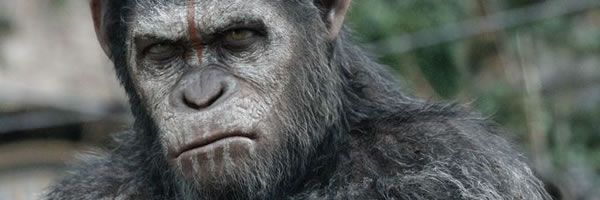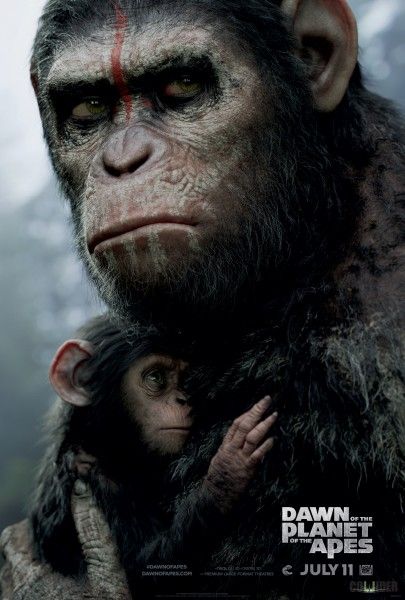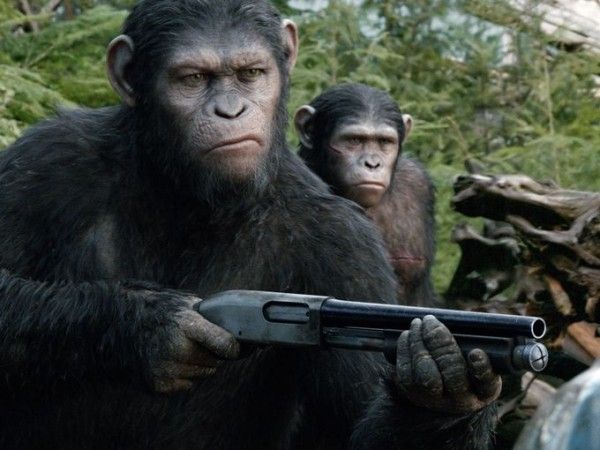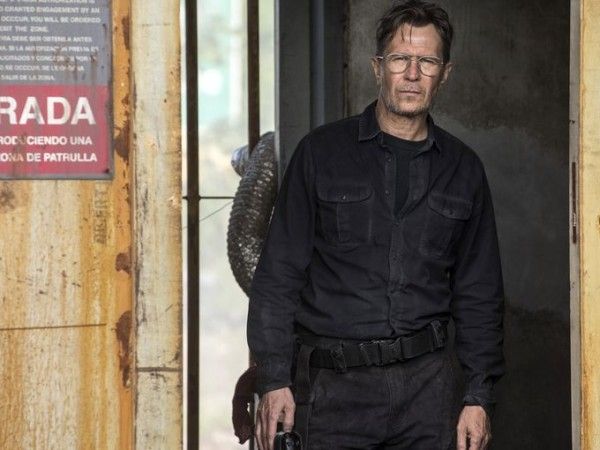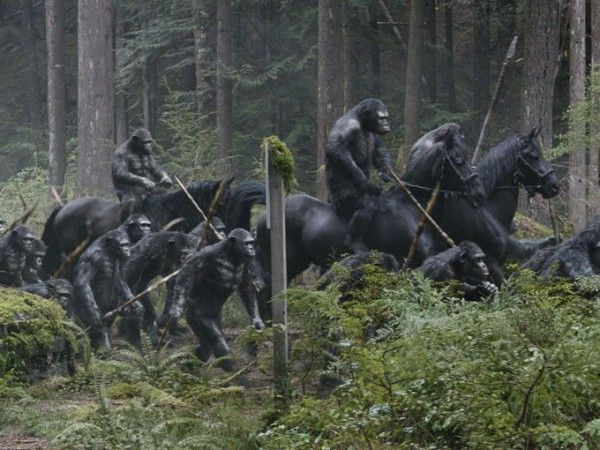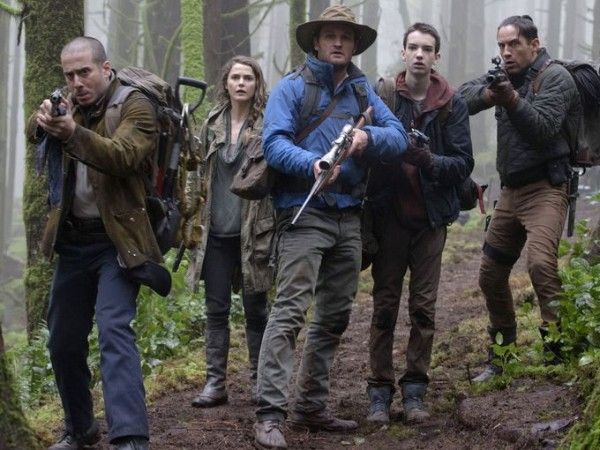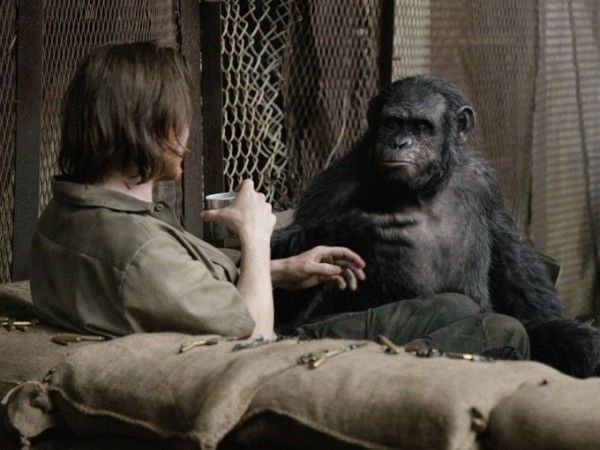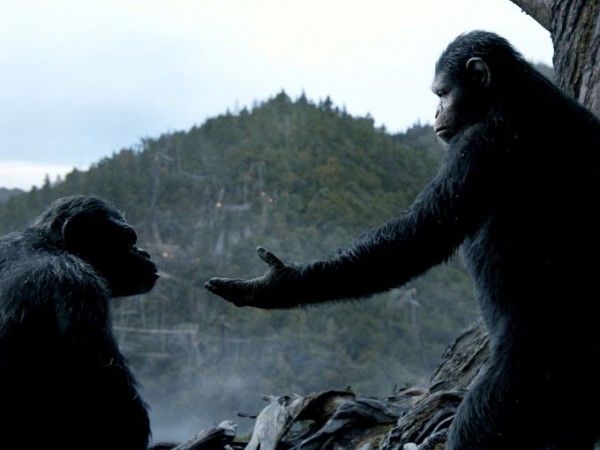Out in theaters on July 11th, Dawn of the Planet of the Apes continues the story of a growing nation of genetically evolved apes, led by Caesar (brought to life by Andy Serkis) and now threatened by a band of human survivors of the devastating virus that was unleashed a decade earlier.
While at WonderCon to hype the upcoming release of the film, co-stars Andy Serkis, Keri Russell and Gary Oldman were joined by director Matt Reeves to talk about the first time they saw the original Planet of the Apes movie with Charlton Heston, why performance capture needs to be understood as just another form of acting, the challenges of taking this film on, the human colony, shooting in New Orleans, and how the third film will be expanded even further. Check out what they had to say after the jump.
Question: What do you remember about the first time you saw the original Planet of the Apes movie with Charlton Heston, and how did that experience impact your enthusiasm to sign on for the franchise?
KERI RUSSELL: These guys are all much older than me. I, obviously, wasn’t alive.
GARY OLDMAN: She wasn’t born. She wasn’t even a twinkle.
RUSSELL: I’m just kidding!
OLDMAN: I can’t imagine childhood without Planet of the Apes. I was nine or ten when the first one came out. It’s not only the opportunity to work with these good people, but you’re also being asked to be a part of cinema history. That was above and beyond the story and Matt [Reeves]. You’re involved with something that, for the most part, comes with a very good pedigree. It went a little wobbly for awhile, but we’re back on track.
MATT REEVES: The thing about Planet of the Apes was that, for a long period of time, it was my childhood. I was so obsessed after seeing that movie. As a kid, seeing the movie, the first thing you want to do is actually become one of those apes. It’s so fascinating. I was so interested in John Cambers’ make-up and seeing gorillas on horseback with guns. That’s a pretty powerful image. And I had the dolls. I had an 8mm reel of Beneath the Planet of the Apes, which I would watch until all the sprockets broke. I was obsessed. And the great thing about seeing Rise of the Planet of the Apes, having been a life-long fan and having always wanted to be an ape, when I saw that movie, I suddenly was an ape. The reason was for a reason that I never would have suspected could ever be done, and that’s that I had emotional identification with an ape. And that blew me away. I thought, “Oh, my god, I can’t believe that now I know what it is to feel that character’s feelings.” The most human character in that story is Caesar, and what Andy [Serkis] did. I was so blown away by that. What’s so exciting about Planet of the Apes is that people say it’s all about the animals becoming in charge, but we are the animals. The idea of having a story about how the animals get in charge, since that’s what we are, the story is about us. What I thought was so exciting about getting into this world is to explore how it’s a blockbuster, and it’s a big, giant effects movie, and it’s a summer movie, but it’s a very unique one, in that it’s about our nature. To explore that from both sides, and to extend the story the way they did in Rise, is such an exciting thing for me. That’s really why I wanted to do it.
Andy, in your first performance of Caesar, you received so much recognition and support, and people campaigned to get your performance nominated. What was that like for you? Do you have any expectation, going forward, that the recognition for what you do will continue to grow?
ANDY SERKIS: I’ve unwittingly become a spokesperson for a perceived discrimination between actors who act in motion capture suits, or in costumes with make-up. I’ve just ended up in this rather weird position, and I shouldn’t be. In actual fact, performance capture is just another bunch of cameras filming an actor’s performance. The most important thing is that that needs to be understood. Regardless of any awards or accolades, it’s really an understanding, not just within our own acting community, but also within the filmmaking community at large. The people who know the most about it are the audience. They seem to be so aware. The younger generation of people who become avatars through video games have no problem understanding that you can become something else, sitting at home and doing that. So, I’ve played lots of different roles, whether they be live-action or performance capture, and you don’t alter your performance because they’re using a different camera to film you. That’s what I feel.
What’s it like working with Andy Serkis as Caesar?
OLDMAN: I come to work and I get into a costume, and Andy comes to work and gets into a costume. At least you can see his face, you can see his eyes, and you can see the emotion. I would actually rather that. If he was wearing a mask, then the question might be, “What’s it like working with someone who’s behind a mask?” But, he’s not.
RUSSELL: It’s Andy. The great thing is that it’s not anything other than a really talented actor. I’m seeing Andy’s eyes and hearing his voice, and hearing him talk about his family. It’s exactly the same as any other scene.
SERKIS: In this film, there are brilliant performances, across the board, from a load of talented actors playing the apes. It is an ensemble piece on the human side, as well.
REEVES: I’d never done motion capture. My main interest in being a director, and the most important thing to me, is that world with the actors. Getting to work with these people was such an incredible experience, and I thank them for that. But the thing that I was worried about was, other than seeing Andy’s work as it had already been translated, I knew that those performances were captivating and I knew that I had been deeply affected by Caesar, but even I didn’t quite understand it. I said, “This is amazing, what they’re doing, but I need to understand it more.” So, at the beginning, what I did was say, “I want to see every shot that Andy did as Andy, and then I want you to show me Caesar.” What blew me away about it was that Andy was better than Caesar. I was so emotionally affected by what he did. I said to WETA, “Wow, it’s amazing that you’re able to translate as much as you did, but in this film, I would love to translate even more.”
At the end of the day, it was such a relief. I realized that the way it works is that you work with a brilliant actor. That’s the secret of mo-cap, which really shouldn’t be a secret. You’re just capturing motion. The genius of what WETA does is faithfully turning that into something. What’s crazy is that Caesar’s anatomy is not Andy’s anatomy. After spending so much time with them, now I know what details they try to take from Andy. It’s a very interesting process. But at the end of the day, the heart of the story and the heart of everything that we’re doing comes down to the actors and to performances that have the emotional authenticity that you can get when you’re working with great actors. As a director, there’s no greater pleasure than being able to just sit back and watch the actors.
Matt, were you hesitant about directing this film, at all?
REEVES: It was a dream and it was terrifying. What essentially happened on the project was that I had a great affinity for Rise and I thought it was really moving, so when they approached me about it, I didn’t know why because I thought that Rupert Wyatt had done such a beautiful job on the film. But it turned out that, for a number of reasons, he didn’t want to do what they wanted to do, and he also thought that the schedule wasn’t enough. Now, having done it, I can tell you that he’s right, the schedule was not enough. So, I said, “What I would be interested in is carrying forward what was established in Rise, which was the emotional heart of those apes.” We all know that it doesn’t become Planet of the Humans and the Apes. It seemed to me that this was a moment where you could actually explore the co-existence between these two populations that are struggling for survival.
The thing that was really important to me was that we carry forward the apes in an emotional way that you can relate to, and we take the humans, in a way that was really different from Rise, and depict them in a way where they’re not villains either. There are no villains in our story. It’s all about survival and trying to find the way to master our nature and the impulses within us. So, I went in and pitched that and they were like, “Okay.” I said, “Oh, okay. So, what’s the catch?” And they said, “The catch is that you need to start shooting very soon.” That was the crazy thing about it. I had to jump in and seize the opportunity, but they were giving me the opportunity to make the movie that I thought would be so exciting to be a part of.
To dive into this world was something that I couldn’t resist. There were a million things I’d never done before. The idea of doing motion capture and the idea of doing effects on this level were things I’d never done. The relief was that, at its center, it was exactly the same as making any movie. But then, after you’ve done that, you have to do a number of really strange things, like shooting the scene again without the actors. All of those things were added complexities that were challenging, but that was part of the thrill of it. It was really like jumping out of an airplane and saying, “I’m doing this. I’m just gonna do this.” I’ve gotta tell you, I would never jump out of an airplane, but I was happy to jump into this.
Having already agreed to direct the next film, how are you looking to expand this world even further?
REEVES: The thing about it is that I think there’s a particular luxury with getting involved with the story. We already know the ending, so the story immediately isn’t about the what happens. It’s about how it happens. I had a screenwriting instructor that I loved, many years ago, who talked to me about stories. He said, “There are the kind of stories that are about the what, and then there are the kind of stories that are about the why.” If you already know what happened, then it becomes about the why, and the why is about psychology and character. That is what I find interesting. When I got involved, they had actually jumped further down the line, closer to Planet of the Apes than I ever wanted to. I thought, “I’m not going to do this movie. I think you should start earlier.” There’s a long and interesting path that’s all about the lives of these people and how they’re affected, in this situation. The idea is that the next phase of this story would be how those lives continue in this struggle. It’s an ongoing struggle, the way that our lives are, every day.
What can you say about the human colony in this movie?
OLDMAN: Initially, we don’t know that there are apes there. This community has survived the epidemic, which has wiped out a huge part of the world. We believe that the military have done their job and basically wiped out the apes. The thing is that we have food and we have water, but the currency, for want of a better word, is electricity. We need that to communicate to the outside world, to actually find out if there is anyone out there, how many are out there, and who is out there. For all intents and purposes, we believe that we could be the only survivors. And then, of course, we discover a community of apes who believe that we’ve all been wiped out. We discover each other, and that’s the drama. Can the apes and can the humans co-exist?
REEVES: For me, the idea was that it’s really a story of two families. There’s a human family and there’s an ape family. The colony is the human family. The difference is that the apes are on the ascendency. We start in this ape world and we’re following their development. In ways, it mirrors our own tribal development. You see as language is coming into being. You’re seeing all of the bonds that have been formed, and the next generation that’s coming, and the civilization that they’re building. They’re really on the way up. But, the humans in the colony just have the most massive tragedy happen to them. They are a family that’s trying to heal itself. So, these two families have to find some way to survive, and the stakes are all about the things that they care about. Also, there’s the question for the humans about what it took for them to still be here, what was lost along the way, and what’s worth fighting for, at this point. All of those questions are very emotional questions. One of the reasons I was excited to have this cast telling this story is because the emotional depth of that was really important to me. I didn’t want to have strawmen humans going, “Let’s see the apes destroy the humans. I can’t wait!” That’s not what this story is about. The struggle is what these two families are going to do to avoid killing each other.
How did filming in such a culturally rich place as New Orleans impact production?
SERKIS: We all had an amazing time shooting it. I love New Orleans. We all had a great time. It’s an extraordinary city to film in. There are difficulties of shooting in 100% humidity. Nobody wanted to stand next to me in a mo-cap suit.
OLDMAN: I love the smell of stale beer and vomit.
SERKIS: On Bourbon Street, particularly. And that was combined with us in our mo-cap suits. You didn’t want to be anywhere near us.
REEVES: It was an interesting smell.
SERKIS: But my god, what a great city. I’d go back there, in a heartbeat. The music scene is just phenomenal, as a jazz fanatic. And we’d go on bike rides. The food was amazing. It was stunning. They are gorgeous people.
Dawn of the Planet of the Apes opens in theaters on July 11th. For more on the film, here are some links to our set visit coverage:
- 45 Things to Know About DAWN OF THE PLANET OF THE APES from our Set Visit
- Andy Serkis Talks Working with Matt Reeves, Advances in Motion-Capture Technology, and More on the Set of DAWN OF THE PLANET OF THE APES
- Jason Clarke Talks Working with Andy Serkis, His Character’s Relationship to Caesar, and More on the Set of DAWN OF THE PLANET OF THE APES
- Cinematographer Michael Seresin Talks Filming in 3D, the Look of the Film, GRAVITY, and More on the Set of DAWN OF THE PLANET OF THE APES

